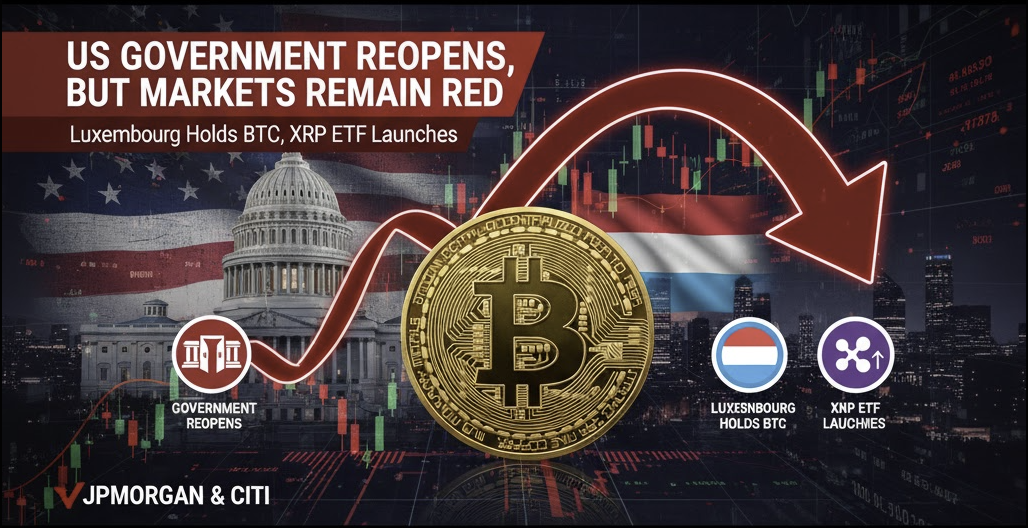President Trump has announced the imposition of tariffs on numerous countries currently engaged in trade negotiations with the US. Amidst these developments, crypto continues to advance, increasingly converging with traditional finance and becoming a prominent topic in political discourse.
Market Overview
US equities closed lower across all three major indices on Monday, July 7th, each declining over 0.7%. Stock futures continued their downward trend. Gold remained stable around $3344 per ounce. Oil prices dropped to $67.7 per barrel.

Bitcoin held steady around $108,000. Altcoins showed mixed trends, with some experiencing slight gains and others slight losses. The overall crypto market capitalization stood at $3.42 trillion.

US Bitcoin spot ETFs saw inflows of $216.4 million on Monday. Similarly, ETH spot ETFs also attracted $62.1 million in inflows. These consistent positive flows into both Bitcoin and Ethereum ETFs underscore continued institutional interest in digital assets, even amidst broader market volatility.

President Trump's imposition of high tariffs on numerous countries is pressuring financial markets and dampening expectations for Fed rate cuts. Indices such as MSCI Japan and shares of Toyota and Honda have declined. The probability of the Fed maintaining interest rates in July has risen to 95%, with the likelihood of only 1–2 rate cuts this year, instead of the previously expected 3–4 cuts. Furthermore, the possibility of President Trump replacing the Fed Chair after his term ends raises concerns about the future direction of monetary policy.
Tariff Updates: Trump's Global Trade Offensive
The Trump administration has sent official letters to South Korea and Japan, announcing that the United States will impose a 25% tariff on imports from these two nations, effective August 1st. The White House also warned that if these countries retaliate with tariffs, the retaliatory tariffs would be compounded on top of the already announced 25% rate. President Trump's message is clear: cease retaliation and engage in negotiations before the tariff deadline.
.jpg)
Additionally, President Trump has unveiled a list of other countries that will face new tariffs, specifically:
- Kazakhstan, Malaysia: 25%
- South Africa: 30%
- Myanmar, Laos: 40%
- Bosnia & Herzegovina: 30%
- Bangladesh, Serbia: 35%
- Indonesia: 32%
- Cambodia, Thailand: 36%
In total, at least 15 countries have received official notification letters about new tariffs from the White House, exceeding the previously mentioned figure of 12 nations. According to Press Secretary Karoline Leavitt, the number of countries receiving such letters could reach up to 100, primarily those without formal trade agreements with the US. Currently, only China, the UK, and Vietnam are the three countries that have reached agreements with the United States.
Notably, European countries are not yet on the tariff list, likely because the negotiation deadline with the EU is set for July 9th. President Trump may wait until after this date to make a decision regarding the European Union bloc. Furthermore, according to Treasury Secretary Scott Bessent, more significant trade announcements are expected within the next 48 hours, and this week is predicted to be "very busy." The new tariff rates are officially set to take effect on August 1st, coinciding with the end of the 90-day tariff deferment period announced in April.
Some market observers are concerned that this represents a hardened stance by the Trump administration. However, Secretary Bessent asserts that this also presents an opportunity for countries without agreements to engage in negotiations with the US between now and the end of the month. The tariff rates announced in the letters are considered "starting points," and if a country takes no action, these rates will be applied from August 1st. Conversely, if negotiation efforts are made, they still have the chance to reach trade agreements and adjust the tariff rates more favorably.
The market's reaction to these announcements has been relatively limited. Shares of some Japanese companies like Toyota and Honda declined by about 4%, while the MSCI Japan ETF dropped over 2%. The MSCI South Korea ETF also corrected by more than 3%. However, both indices have seen strong growth year-to-date, indicating that investors still view this as a pressure tactic to drive negotiations, rather than a fixed, long-term tariff policy.
SEC Issues Crypto Guidance: Paving the Way for New Product Launches
The SEC has published guidance aimed at establishing clearer regulations for crypto investment funds. This move is expected to accelerate the launch of new products, especially as numerous crypto ETFs await approval. This long-anticipated guidance provides crucial clarity for the burgeoning digital asset sector.

The guidance aims to help fund managers understand the process for seeking approval for crypto ETFs and is expected to expedite new product launches, given the large number of ETFs currently awaiting regulatory decisions. To gain approval, issuers must clearly explain (in plain language) the specific characteristics of crypto ETFs, such as asset custody methods and associated unique risks.
A second, more significant document is anticipated, which is expected to include a new listing form that would eliminate the need for exchanges to file separate applications for each new crypto product they wish to list. This streamlining would significantly reduce the regulatory burden and foster greater innovation.
Beyond the SEC, the US Congress will host a crucial hearing on the cryptocurrency sector on July 9th. This event, chaired by the House Ways & Means Oversight Subcommittee, is themed: "Making America the Crypto Capital of the World." The hearing aims to develop a modern tax policy framework for digital assets. Lawmakers will focus on discussing how to attract crypto businesses and investors to the US, as well as establish clear tax regulations to support innovation in blockchain technology and decentralized finance.
Concurrently, the Trump administration is expected to release a report on its Bitcoin and crypto policy around July 22nd. The report may include details on a national Bitcoin reserve and emphasize ensuring crypto companies receive fair banking services from institutions like the Fed. These multi-faceted regulatory and policy initiatives underscore the US government's growing strategic interest in digital assets.
Traditional Finance and Crypto's Growing Convergence
Traditional finance and crypto are steadily converging, ushering in a completely new era. Major financial corporations are aggressively seeking ways to deliver crypto products to their clients, while crypto exchanges are racing to tokenize traditional stocks and assets. In just the past few weeks, the pace of innovation has been breathtaking:
- Kraken has launched xStocks, transforming US stocks into tradable tokens on the Solana blockchain.
- Robinhood now allows European users to buy US stocks as tokens on Arbitrum (an Ethereum Layer 2) and is planning to build its own blockchain called Robinhood Chain.
- Gemini has implemented tokenized US stock trading in the European Union, also utilizing the Arbitrum network.
- Coinbase has filed an application with the US SEC for approval to issue shares on a blockchain, most likely leveraging the Base network (an Ethereum Layer 2).
These practical applications of blockchain and crypto are far surpassing the concept of mere "stores of value" like Bitcoin. This is just the beginning. Tokenization will be the next wave, starting with bonds, then extending to stocks, real estate, legal documents, and many other types of assets.

We often fail to recognize a major transformation as it is happening because we typically only see a small part of the picture rather than the whole, until we look back later. Furthermore, along the path of development, numerous failed efforts can make our vision even more obscure. The internet originated with ARPANET in 1969, TCP/IP in 1983, and the World Wide Web in 1991. But it wasn't until around 2000 that email became an indispensable tool for businesses, only later spreading into personal lives. Back then, people laughed at Bill Gates for listening to baseball over the internet instead of turning on free radio or watching TV with pictures. They also mocked Netflix for taking hours just to download a grainy 30-minute video, let alone streaming high-quality movies. The current rapid developments in tokenization and blockchain adoption might feel similar to those early days of the internet, hinting at a truly transformative future for global finance.
Other Key Crypto Updates
Elon Musk has officially formed a new political party called the "America Party" to influence policy by winning key seats in the US Congress. He affirmed that this party supports Bitcoin because "fiat money is hopeless." This marks the first time in a long while that Musk has publicly mentioned crypto, indicating that Bitcoin has entered the US political arena. However, Musk's deeper dive into politics has raised investor concerns, particularly regarding potential strained relations with Trump that could affect Tesla and SpaceX. Following the announcement of his party, Tesla's stock dropped nearly 7%, wiping out $67 billion in market capitalization. Many shareholders are also concerned that Musk is juggling too many roles, potentially impacting business operations.
Mercado Bitcoin, Brazil's largest crypto exchange, has just launched tokenized bonds and stocks valued at $200 million on the XRP Ledger (XRPL) blockchain. Previously, they had tokenized 1 billion Brazilian real (approximately $185 million) in private credit products and used Ripple Payments for money transfers between Brazil and Portugal. This showcases the growing real-world utility of blockchain for traditional financial instruments.
Metaplanet, a publicly traded company, purchased an additional 2,205 BTC, increasing its total holdings to 15,555 BTC. This continued accumulation solidifies Metaplanet's position as a significant corporate holder of Bitcoin.
Jack Dorsey recently launched Bitchat—a decentralized messaging application that uses Bluetooth mesh, allowing messages to be sent without the internet or servers. Each phone acts as a relay, transmitting encrypted messages within a 30-meter range, requiring no accounts or personal information. This innovative application highlights the potential for decentralized communication solutions.
Spanish company Vanadi Coffee has acquired an additional 3 Bitcoin at an average price of 94,092 euros per Bitcoin, bringing its total Bitcoin holdings to 69 BTC. This demonstrates the growing trend of small to medium-sized enterprises integrating Bitcoin into their treasury strategies.
Bit Digital, a Bitcoin mining company, sold approximately 280 Bitcoin to purchase more Ethereum and raised $172 million from a stock issuance. They now own over 100,603 ETH, making them one of the largest publicly listed holders of Ethereum, with plans for continued future purchases. This strategic pivot from Bitcoin to Ethereum mining and holding highlights the evolving strategies within the crypto mining sector.
CoreWeave announced that it will acquire Core Scientific through a stock exchange, where Core Scientific shareholders will receive CoreWeave stock. The deal aims to expand data centers, drive long-term revenue growth, and optimize profitability. Core Scientific currently holds 977 BTC. This acquisition underscores the growing consolidation and strategic moves within the crypto mining and data center industries.
Sources
- Bloomberg
- CoinDesk
- U.S. Treasury
- TradingView
- Reuters
- SEC
- White House Press Office
- CryptoQuant
- Jack Dorsey's Twitter/X
- Metaplanet Investor Relations
- Vanadi Coffee Investor Relations
- Bit Digital Investor Relations
- CoreWeave Investor Relations
Disclaimer
This article is for informational purposes only and should not be considered financial advice. Please do your own research before making investment decisions.


.png)





